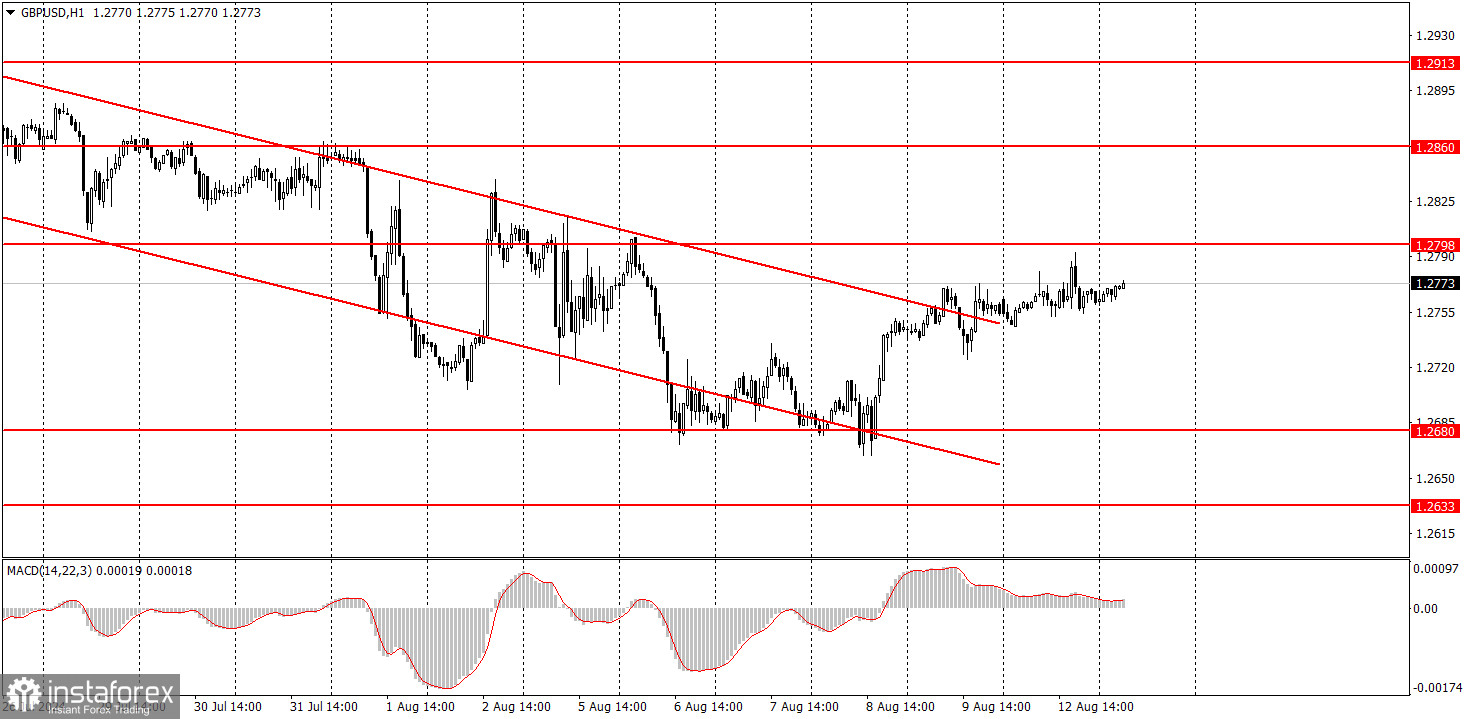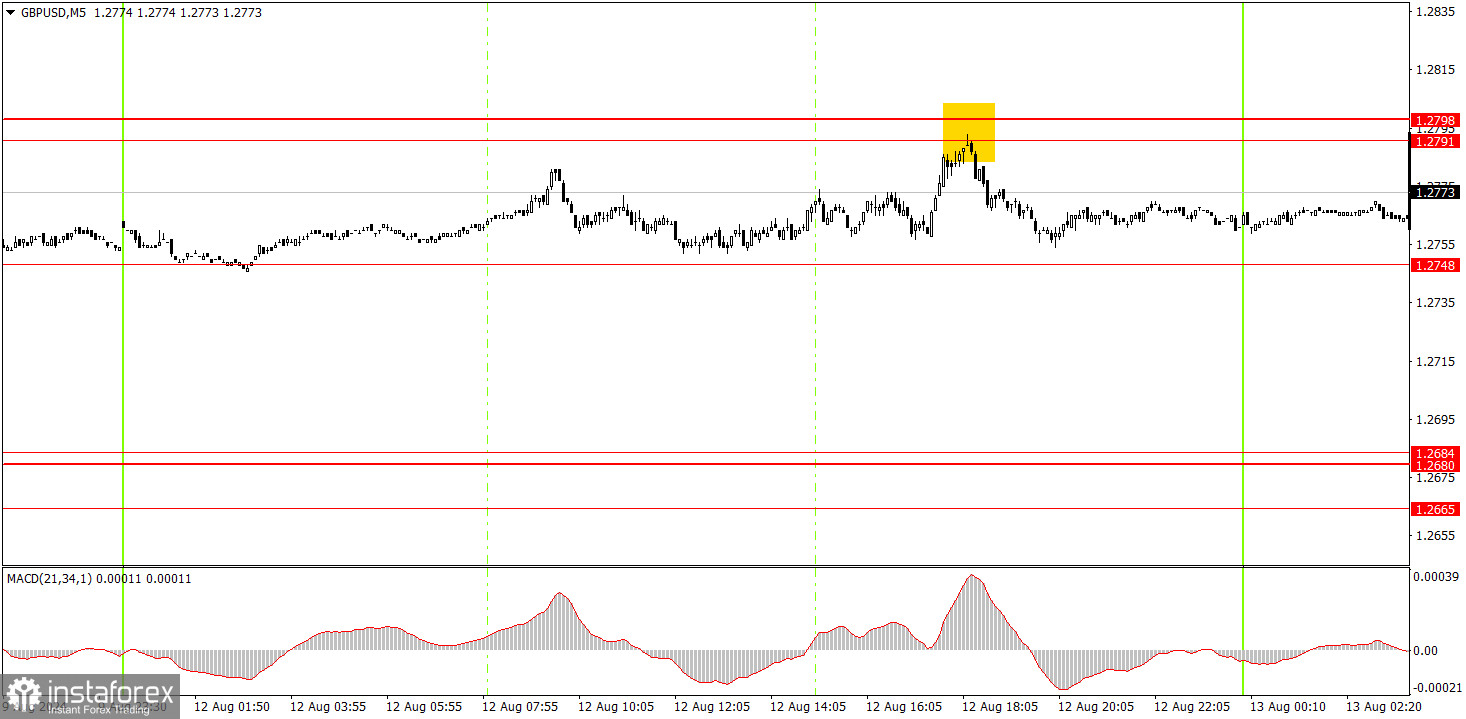Analyzing Monday's trades:
GBP/USD on 1H chart

The GBP/USD pair also showed no interesting movements on Monday due to a lack of macroeconomic and fundamental events. The most interesting developments for the British pound will begin today. However, we would like to note that the reports on unemployment, jobless claims, and wages, which will be released in a few hours, are unlikely to be considered "crucial." The market may react to these reports, but the reaction is unlikely to be strong. On the other hand, crucial reports on inflation in the UK and the US will be released on Wednesday. The future of the GBP/USD pair will largely depend on these reports.
From a technical perspective, the pair has settled above the descending channel, so it may continue to rise for some time. If this week's macroeconomic data do not support the dollar, the rise will be reinforced.
GBP/USD on 5M chart

Only one trading signal was generated in the 5-minute time frame on Monday, and volatility left much to be desired. During the US trading session, the price bounced off the 1.2791-1.2798 area and dropped about 20 pips. Beginners could have earned these 20 pips.
Trading tips on Tuesday:
In the hourly time frame, GBP/USD has a good chance of sustaining the downtrend but is currently going through an upward correction. The British pound is still overbought, while the dollar is undervalued. The Bank of England has started lowering its borrowing costs, which may continue to put pressure on the pound. The correction could become more substantial than it is now, but much will depend on this week's macro data.
On Tuesday, beginners can trade from 1.2748 again, as the price returned to this level yesterday. However, the likelihood of strong movements today is again low.
The key levels to consider on the 5M timeframe are 1.2547, 1.2605-1.2633, 1.2684-1.2693, 1.2748, 1.2791-1.2798, 1.2848-1.2860, 1.2913, 1.2980-1.2993, 1.3043, 1.3102-1.3107, 1.3145. On Tuesday, relatively important reports on unemployment, jobless claims, and wages will be released in the UK. These data and the US Producer Price Index may trigger only a minor market reaction.
Basic rules of a trading system:
1) The strength of a signal is determined by the time it took for the signal to form (bounce or level breakthrough). The shorter the time required, the stronger the signal.
2) If two or more trades around a certain level are initiated based on false signals, subsequent signals from that level should be ignored.
3) In a flat market, any currency pair can produce multiple false signals or none at all. In any case, it's better to stop trading at the first signs of a flat market.
4) Trades should be opened between the start of the European session and mid-way through the U.S. session. All trades must be closed manually after this period.
5) In the hourly time frame, trades based on MACD signals are only advisable amidst substantial volatility and an established trend, confirmed either by a trendline or trend channel.
6) If two levels are too close to each other (from 5 to 20 pips), they should be considered as a support or resistance zone.
7) After moving 15 pips in the intended direction, the Stop Loss should be set to break-even.
What's on the charts:
Support and Resistance price levels: targets when opening long or short positions. You can place Take Profit levels near them.
Red lines represent channels or trend lines that depict the current trend and indicate the preferred trading direction.
The MACD (14,22,3) indicator, encompassing both the histogram and signal line, acts as an auxiliary tool and can also be used as a source of signals.
Important speeches and reports (always noted in the news calendar) can profoundly influence the price dynamics. Hence, trading during their release calls for heightened caution. It may be reasonable to exit the market to prevent abrupt price reversals against the prevailing trend.
Beginners should always remember that not every trade will yield profit. Establishing a clear strategy, coupled with effective money management, is key to long-term success in trading.
 English
English 
 Русский
Русский Bahasa Indonesia
Bahasa Indonesia Bahasa Malay
Bahasa Malay ไทย
ไทย Español
Español Deutsch
Deutsch Български
Български Français
Français Tiếng Việt
Tiếng Việt 中文
中文 বাংলা
বাংলা हिन्दी
हिन्दी Čeština
Čeština Українська
Українська Română
Română

